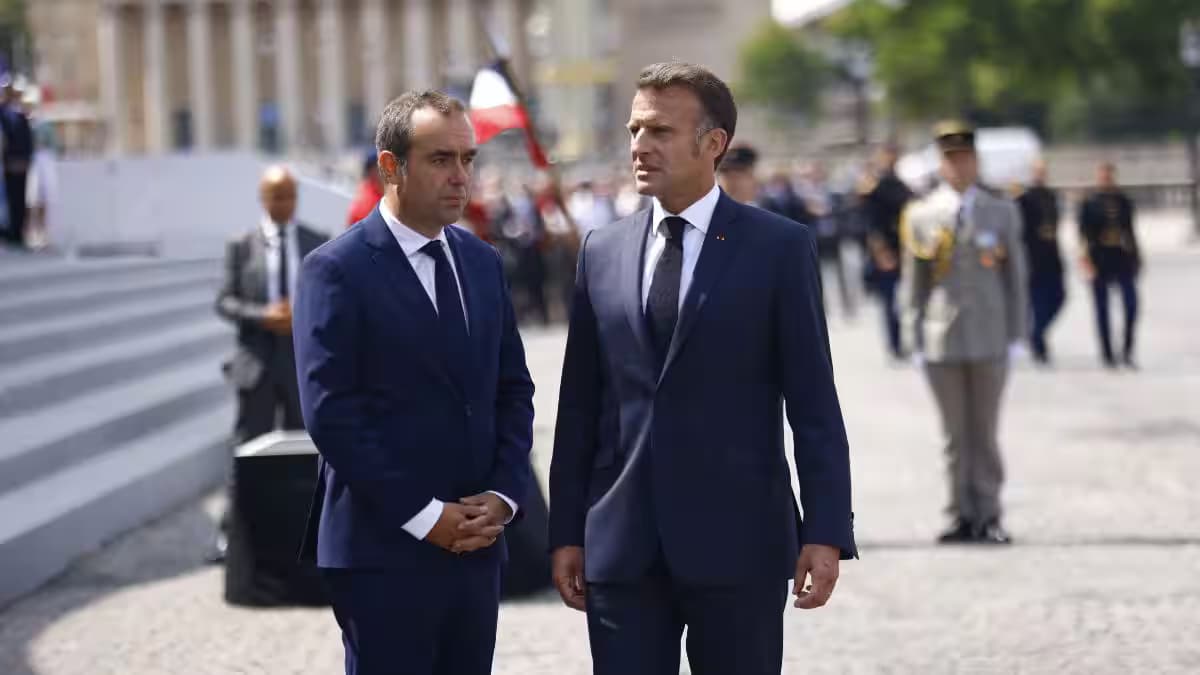We're loading the full news article for you. This includes the article content, images, author information, and related articles.
President Emmanuel Macron faces mounting pressure to resolve France's political deadlock as his approval ratings plummet and a third prime minister resigns within a year, raising questions about his ability to govern until 2027.

French President Emmanuel Macron, once self-proclaimed as the "master of the clocks," is grappling with a severe political crisis that has seen his authority diminish significantly. For the third time in a year, his chosen prime minister has resigned, most recently Sébastien Lecornu, who stepped down on Monday, October 6, 2025, after less than a month in office. This rapid turnover of leadership, including Michel Barnier and François Bayrou, underscores the deep instability plaguing the French government since snap legislative elections in 2024 resulted in a hung parliament.
Opinion polls reflect a stark decline in public confidence in Macron's leadership. An Elabe poll commissioned by Les Echos on Wednesday, October 8, 2025, indicated that only 14% of French citizens trust Macron to effectively address the nation's challenges. This figure represents a historic low for Macron, matching the unpopularity record of his predecessor, François Hollande, in November 2016. Another poll by sociological service Verian in September 2025 showed his approval rating at 15%, the lowest since his election in 2017.
Macron was re-elected for a second five-year term in April 2022, with his mandate set to conclude in May 2027. The French constitution limits presidents to two consecutive five-year terms. However, the political landscape shifted dramatically after the 2024 legislative elections, which Macron called in response to the far-right's success in the European parliamentary elections. The outcome was a hung parliament, divided into three major blocs: the left-wing New Popular Front, Macron's centrist Ensemble alliance, and the far-right National Rally, with no single bloc commanding a majority.
This fragmentation has made it exceedingly difficult for Macron's minority governments to secure parliamentary support, particularly for crucial budgetary matters. The inability to pass a budget has exacerbated France's financial woes, with its debt-to-GDP ratio being the European Union's third-highest.
The French President holds the power to dissolve the National Assembly and call for new legislative elections, a measure typically employed to resolve parliamentary stalemates. However, this power can only be exercised once a year. Macron previously dissolved the National Assembly in June 2024, a gamble that backfired by producing an even more fractured parliament. While Macron has repeatedly stated he will not resign before his term ends in 2027, the option of dissolving parliament again or appointing yet another prime minister remains.
The ongoing crisis has stalled policy execution, with stakeholders urging clarity on timelines, costs, and safeguards for the stability of the country. The outgoing Prime Minister, Sébastien Lecornu, was tasked by Macron to hold last-ditch talks with political parties to define a platform for action and stability, with a focus on passing the 2026 budget.
The political turmoil has drawn strong reactions from various political figures. Former Prime Minister Édouard Philippe, who served under Macron from 2017 to 2020, urged the president to step down, suggesting an early presidential election once the next year's budget is adopted. Gabriel Attal, another former Prime Minister, also expressed his lack of understanding regarding Macron's decisions, advocating for a different approach after a succession of prime ministerial changes. Marine Le Pen, leader of the far-right National Rally, has called for Macron's resignation and snap legislative elections.
The ongoing political instability carries significant risks for France, both domestically and internationally. The inability to form a stable government and pass a budget could further exacerbate the country's economic challenges. The political deadlock has also caused tremors across Europe, with a German government spokesman emphasizing the importance of a stable France for European stability. The crisis could also empower opposition parties, particularly the far-right National Rally, ahead of the 2027 presidential elections.
A key unanswered question is whether a new government can be formed that can command a parliamentary majority, or if Macron will be forced to dissolve parliament again. While outgoing Prime Minister Lecornu suggested that most lawmakers oppose another dissolution and a parliamentary majority might coalesce to pass the 2026 budget, the path forward remains uncertain. The possibility of Macron's resignation, though he has ruled it out, continues to be a topic of discussion among his opponents.
Observers will be closely watching Macron's choice for the next prime minister and their ability to forge a working majority in the fractured National Assembly. The success or failure of passing the 2026 budget will be a critical indicator of the government's stability. Any further resignations or continued parliamentary deadlock could reignite calls for snap legislative elections or even Macron's resignation.
Keep the conversation in one place—threads here stay linked to the story and in the forums.
Sign in to start a discussion
Start a conversation about this story and keep it linked here.
Other hot threads
E-sports and Gaming Community in Kenya
Active 9 months ago
The Role of Technology in Modern Agriculture (AgriTech)
Active 9 months ago
Popular Recreational Activities Across Counties
Active 9 months ago
Investing in Youth Sports Development Programs
Active 9 months ago